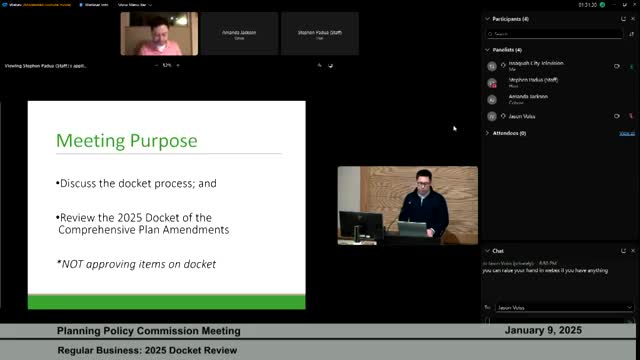Issaquah docket for 2025 includes middle-housing updates, co-living, land-use map change for food bank site
Get AI-powered insights, summaries, and transcripts
Subscribe
Summary
The Issaquah Planning Policy Commission on Jan. 9 reviewed the city's proposed 2025 docket of comprehensive-plan and code amendments, including middle-housing renaming, state-required co-living changes, a land-use map change tied to the Issaquah Food Bank site, and a transportation concurrency evaluation.
The Issaquah Planning Policy Commission on Jan. 9 reviewed the city's proposed 2025 docket of comprehensive-plan and code amendments, which staff said will be the year'long list of topics considered for plan or code changes.
Items on the proposed docket include: renaming the single-family land-use categories to better describe allowed uses (a step tied to the city's middle-housing work); implementing state-required allowance for co-living in residential zones that allow more than six units (a response to House Bill 1998); updating the land-use designation map to accommodate a proposed sale and continued operation by the Issaquah Food Bank (the food bank site would shift from a "community facilities" designation to "retail" in the city's mapping) and a broader proposal to remove "community facilities" as a separate designation and defer city-owned properties to their underlying zones; and a transportation-element update tied to an upcoming concurrency evaluation that could yield policy changes.
Food bank and surplus property questions: Staff used the proposed food bank transaction to illustrate why the city is proposing removal of "community facilities" as a land-use designation: the current designation requires a map amendment or rezone for surplused city properties, slowing or complicating transfers. Staff said the city and the food bank are negotiating a purchase so the food bank can operate long-term at its current site. Commissioners asked whether the property must go on the open market and whether any resale restrictions or covenants would be included; staff said they would review the sale terms and will return with additional information. Staff said they will bring a map of all city-owned properties that would be affected if "community facilities" were removed from the land-use map.
Why it matters: The docket is the statutorily required once-a-year starting list for potential comprehensive-plan amendments; it determines which subjects the city will study and potentially amend during the year. Commissioners noted the practical consequences for surplus city property transfers, housing regulation compliance with state law, and the transportation concurrency work that will inform development review.
Process and next steps: Staff framed the docket as the list of items to consider, not final approvals. Staff said the commission will hold a public hearing on the docket (staff listed a PPC hearing on Jan. 23) and then send the docket to city council for potential adoption in early March. Individual docket items will return to the commission as separate projects with their own public hearings and final reviews during 2025.
